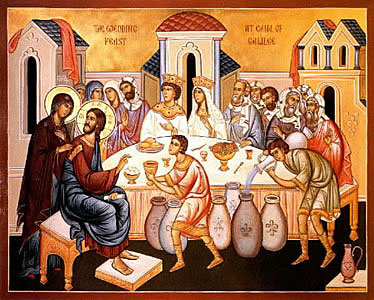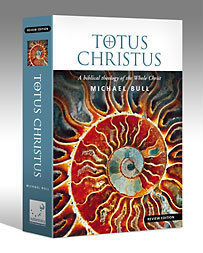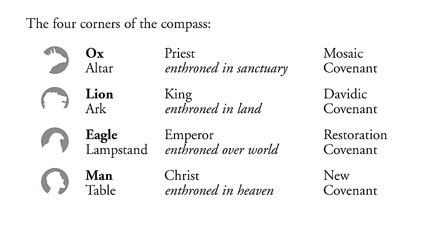Oct
26
2009

Daniel was taken to Babylon before the destruction of Jerusalem. As the ruler over the king’s advisors, it is highly likely he was involved in the razing of Jerusalem.
The Lord sent Joseph into Egypt as a forerunner, established his house and integrated the old house of Jacob into it. Pharaoh was converted under the ministry of Joseph, humbled himself before Jacob and requested a blessing.
The Lord did the same thing with Daniel. A new house was being established in Babylon before the final demolition of the old Temple. Daniel ascended as “firstfruits”. He stood on the mountain of God as Abraham, as Moses. At the right hand of the power he would bring the curses of the Law raining down upon the Covenant breakers. As Abraham bargained with God, perhaps the mercy shown to Judah’s poor was the work of Daniel.
Continue reading
Comments Off | tags: Babylon, Bible Matrix, Cyrus, Daniel, Esther, Ezekiel, Haggai, Haman, Joshua, Mordecai, Nebuchadnezzar, Zerubbabel | posted in Biblical Theology, The Restoration Era
Oct
19
2009
More Thoughts on Prophetic Cauldrons
“Out of the frying pan into the fire.”
 The structure of Ezekiel follows the “soundwaves” pattern found in a great deal of the Bible, particularly the prophets. The Lord speaks His word as liturgy from the Most Holy Place, it is pre-enacted by the prophet in a new “Holy Place” (from outside the city – see Rags to Robes) in some terrifying judgments as object lessons (see Liturgy as Prophecy), and then the same judgments are played out in greater detail in the “Outer Court.” All three sections are heptamerous, and in these three areas we have Word, Sacrament (the prophet as a kind of new “acting” High Priestly mediator – see How to Read the Prophets), and Government.
The structure of Ezekiel follows the “soundwaves” pattern found in a great deal of the Bible, particularly the prophets. The Lord speaks His word as liturgy from the Most Holy Place, it is pre-enacted by the prophet in a new “Holy Place” (from outside the city – see Rags to Robes) in some terrifying judgments as object lessons (see Liturgy as Prophecy), and then the same judgments are played out in greater detail in the “Outer Court.” All three sections are heptamerous, and in these three areas we have Word, Sacrament (the prophet as a kind of new “acting” High Priestly mediator – see How to Read the Prophets), and Government.
The book of Ezekiel begins with this pattern, so we have the prophetic cauldron turn up three times. Each cycle takes us through the Tabernacle speeches (Exodus 25-31) which follow the Creation Week, so this is a process of new Creation for the anointing of Ezekiel and of de-Creation for the old Tabernacle of Solomon’s Temple. It was decayed and ready to vanish away.
Continue reading
Comments Off | tags: Babylon, Daniel, Ezekiel, Luke, Nebuchadnezzar | posted in Biblical Theology, The Last Days, The Restoration Era
Jul
21
2009
or Cutting Off the Generations of the Wicked

O daughter of Babylon, who are to be destroyed, Happy the one who repays you as you have served us! Happy the one who takes and dashes your little ones against the rock!
(Psalm 137:8-9)
A further comment on Psalm 137 (following Church and State and Liturgy as Prophecy):
The church has the power to excommunicate, but the state alone has the power to execute. In Joshua’s and David’s time, church and state were one, thus Israel’s army slaughtered God’s enemies judicially. In Mordecai’s time, the slaughter of Haman’s followers by the Jews occurred only after church and state became one under Mordecai’s new executive power.
You must be logged in to see the rest of this post.
Join now for a year for $15!
As an advisor to the state, the church gives the word, and offers the sacraments, but it is always the state that carries out the judgment — government. The state is the “outer court” into which the living sword-water flows. Some taste life and others taste death. [1]
Continue reading
Comments Off | tags: AD70, Babylon, Joshua, Mordecai, Nebuchadnezzar, Psalms, Zedekiah | posted in Biblical Theology, The Last Days, The Restoration Era, Totus Christus
Jun
8
2009
or Touch Not, Taste Not, Handle Not II

The dietary Laws given to Moses were an expansion of the command given to Adam. It is the self-denial of priestly obedience to God. Adam wasn’t ready for the tree of judicial responsibility (kingdom) but he seized it.
In the greater Bible picture, Israel’s history (from Moses) is this period of priestly obedience. But Jesus came and reversed Adam’s failure. Consequently the dietary laws are revoked, and with greater maturity, the people of God (through the first century death of Israel and her resurrection as the church) now, like Jesus, have the judicial wisdom of the Spirit, and the power to eat unclean things (Gentiles), consume them and make them clean. Only the power of resurrection can enter a room with a corpse in it, touch lepers and feast on Gentile meats and not be made unclean, but instead make the unclean clean by consuming it. This is the power of the New Covenant.
Continue reading
Comments Off | tags: Babylon, Crystal Sea, Daniel, Esther, Food laws, Postmillennialism, Priesthood, Resurrection, Scavengers, Tabernacle | posted in Biblical Theology
May
25
2009

Ascension Sunday
Andrew Katay posted a quote this week stating that when the church fails to emphasise the Ascension, a commitment to church programs instead of to Christ fills the vacuum. This should come as no surprise.
Continue reading
Comments Off | tags: Ascension, Babel, Babylon, Herod, Moses, Passover, Revelation | posted in Biblical Theology, The Last Days, Totus Christus
May
20
2009
The Purpose of the Restoration Covenant
“The restoration period is the last era of Israel’s history as the people of God and the climactic period of old covenant. The kingdom of God has grown beyond Israel and spread to the nations, who are the God-appointed protectors of His priestly people. Israel’s loss of independence and submission to Gentile powers was not a backward movement in the kingdom program of God. Abraham had been chosen by God so that through him all the nations of the world could be blessed (Gen. 12:3). In the restoration era, this was fulfilled more than at any other time in Israel’s history. Through the dispersion Jews had spread all over the world and they brought with them the knowledge of the true God.
Continue reading
Comments Off | tags: Babylon, Covenant Theology, Daniel, David, Ezekiel's Temple, Nathan, Persia, Restoration, Temple | posted in Biblical Theology, Quotes, The Restoration Era
Apr
17
2009
The Third Trumpet
De-Ascension – the Temple judged
The third angel blew his trumpet, and a great star fell from heaven, blazing like a torch,
 After the ascension of Christ, Satan was expelled from his “ministry” before God as the Accuser of man. Like the evil twin of the blazing torch that measured Abram’s sacrifices, he was then used by God to bring an end to the Covenant.
After the ascension of Christ, Satan was expelled from his “ministry” before God as the Accuser of man. Like the evil twin of the blazing torch that measured Abram’s sacrifices, he was then used by God to bring an end to the Covenant.
and it fell on a third of the rivers and on the springs of water. The name of the star is Wormwood. A third of the waters became wormwood, and many people died from the water, because it had been made bitter.
These first three trumpets concerned the Land (Judah), the Sea (the world empire) and the springs of water (the Temple). This same order began the song of ascension, Psalm 24:
Continue reading
Comments Off | tags: Babylon, Compromise, Esau, Herod, James Jordan, Numbers, Restoration, Revelation, Satan, Solomon, Wormwood | posted in Biblical Theology, The Last Days, Totus Christus
Apr
11
2009

It was always God’s plan that Israel have a human king:
“When you come to the land which the LORD your God is giving you, and possess it and dwell in it, and say, ‘I will set a king over me like all the nations that are around me,’ you shall surely set a king over you whom the LORD your God chooses; one from among your brethren you shall set as king over you; you may not set a foreigner over you, who is not your brother.” Deut. 17:14-15
Like Adam, this dominion would only come by obedience: by servanthood to God and faithful mediatory witness to the Gentiles. But like Adam, they seized dominion and demanded “a king like the Gentiles.” With Saul, they had a king who palled around with Agag of Amalek whom Moses commanded to wipe from the face of the earth.
Continue reading
Comments Off | tags: Abimelech, Amalek, Babylon, Covenant Theology, Daniel, Exile, James Jordan, Malachi, Mordecai, Temple, Zechariah | posted in Biblical Theology, The Restoration Era
Apr
11
2009
 We don’t know how many wise men travelled from the east, but perhaps we can make a guess via God’s deliberate typology.
We don’t know how many wise men travelled from the east, but perhaps we can make a guess via God’s deliberate typology.
You must be logged in to see the rest of this post.
Join now for a year for $15!
1 comment | tags: Babylon, Christmas, Incense Altar, Lampstand, Table of Showbread, Typology | posted in Biblical Theology
Apr
10
2009
Sacramental Doses of Death
Water, fire, salt and wine are symbols of judgment. In small quantities they bring life and keep death at bay (defilement). In large quantities, God uses them to destroy an irredeemable culture:
Syncretised sons of God (Gen 6) – water
Sodom – fire and salt (Gen 18-19)
The old Canaanite world, then Babylon – wine (Jer 25)
 For the church to be “salty” means it brings sound judgment to society. To lose its saltiness is the same as fire not being hot, or water not being cold. If we are not salty, we are lukewarm, and things that should be mortified in the church are not dealt with. Judgment begins at the house of God and flows to the nations.
For the church to be “salty” means it brings sound judgment to society. To lose its saltiness is the same as fire not being hot, or water not being cold. If we are not salty, we are lukewarm, and things that should be mortified in the church are not dealt with. Judgment begins at the house of God and flows to the nations.
In this context, the following words of James Jordan are not so shocking as they might otherwise appear:
The coming of the kingdom always involves the violent destruction of the wicked. When God announced the birth of Isaac, He immediately went out and destroyed Sodom (Genesis 18-19). These events are linked. The rescue of Israel from Egypt entailed the destruction of Egypt. The coming of the Spirit at Pentecost is followed by the slaying of Ananias and Sapphira. The New Covenant brought with it the horrors of AD70.1 Jesus is Kinsman Redeemer/Avenger. In Hebrew, redeem and avenge are the same word: ga’al.
Christians should rejoice at the privilege of bringing holy violence against the wicked and violating their plans and their wicked integrity. In union with Christ, who is both Redeemer and Avenger, Christians have both privileges. Serving in the Church, Christians extend redemption. Serving in the State, Christians extend Vengeance where necessary. The Christian serving as President of the USA should have Osama bin Laden captured and brought to Washington. Then, in front of television cameras from all nations of the world, the Christian President should smilingly blow bin Laden’s brains out, and publicly praise the Triune God for the privilege of doing so. Anyone who disagrees with this has no notion of what his baptism into union with Christ means.
A theology of indiscriminate “non-violence” is pure Satanism. It gives the world to the devil. In Christ we are now adults, and as adults we have grown-up responsibilities. One of those is the joyous privilege of exercising violence against the wicked.2
I have to say, I gulped hard when I first read this. But such a reaction shows how far out of step with Christ we are in our thinking. And such a judgment assumes we are already judging ourselves rightly with sacramental doses of water, fire, salt and wine and not hypocrites. The problem with the world begins with me.
_____________
1 Read Frederick Farrar’s summary here.
2 James B. Jordan, Evil Empire?, Biblical Horizons Newsletter No. 199, September 2008. Subscribe at www.biblicalhorizons.com
Comments Off | tags: AD70, Babylon, Communion, Compromise, Culture, Genesis, James Jordan, Justice, Wisdom | posted in Ethics


































